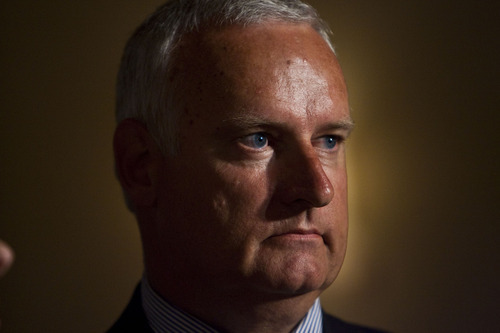This is an archived article that was published on sltrib.com in 2011, and information in the article may be outdated. It is provided only for personal research purposes and may not be reprinted.
If Salt Lake County is going to ask taxpayers to pay for parks, mass transit or other high-dollar projects through a public bond, it should do so during a general election when voter turnout is highest.
So says County Councilman Richard Snelgrove, who has introduced a proposed ordinance that would prohibit officials from pitching bond-related tax increases to voters during odd-numbered election years. Instead, those initiatives would have to come during general elections when presidential or congressional races are pulling people to the polls.
The measure comes after Mayor Peter Corroon unsuccessfully urged the council to put a $110 million bond on this fall's ballot to build new parks and spruce up existing ones. The council postponed the initiative for a year partly because Republicans such as Snelgrove raised concerns about voter turnout.
"I would like to have bonds presented to the public when there can be maximum participation by taxpayers," Snelgrove said. "Since they affect 100 percent of property owners, it is only fair that they go to voters only in general-election years."
The initiative passed through a county subcommittee Tuesday and now heads to the full council, where it will encounter some resistance.
Democratic Councilman Randy Horiuchi says Snelgrove's plan would deprive county leaders of needed flexibility when weighing the timing of potential bonds. Low interest rates, for example, could make a bond worthwhile during an off-year election.
"It is a backwards-thinking approach," Horiuchi said. "We ought to believe that voters [even during an off-year election] have the interest and civic spirit to voice their opinion on a particular issue to improve their community."
But Snelgrove worries about fairness. If the proposed parks bond had gone to the ballot in this year's municipal runoffs, he said, it would have been the only election item for tens of thousands of households in unincorporated areas. Voter turnout there, he said, undoubtedly would have been lower than in, say, Salt Lake City, where a mayor is up for re-election.
"It is a decision by the few," Snelgrove said, "determining the tax impact on the many."
Democratic Councilman Arlyn Bradshaw reached a compromise with Snelgrove on Tuesday that would allow the council to override the ordinance if necessary. The agreement was this: If the mayor declares an emergency or if the council votes by a 6-3 supermajority, a bond could go before the public during a municipal election year.
Bradshaw is "more comfortable" with Snelgrove's proposal with that language included but hasn't decided whether he will vote for it in the end.
The business-backed Utah Taxpayers Association favors the measure.
"The Taxpayers Association supports having the greatest number of voters possible vote on whether a bond should be approved," spokesman Royce Van Tassell said. "By moving those bonds to a general-election year, preferably in November, then this ordinance will allow ever more people to vote on those bonds."
Corroon, a Democrat in his second and final term as mayor, considers it unwise to limit government's options. He argued this year in favor of putting a countywide parks bond before voters while interest rates and construction costs are low. Waiting a year, he fears, could make those projects more expensive.
"Limiting our options is not good," he said. "The Legislature has allowed counties to bond during certain times of the year. I don't think we should override the Legislature."
Although it is too early to say whether he would veto the measure, Corroon said he disagrees with an ordinance that would unnecessarily "tie our hands."
Twitter: Stettler_Trib —
What the proposed ordinance says
"A bond election may be held, and the proposition for the issuance of bonds may be submitted, on the same date as any general election held in Salt Lake County. A bond election may not be held on the same date as a municipal election or any other date prohibited by state law."



